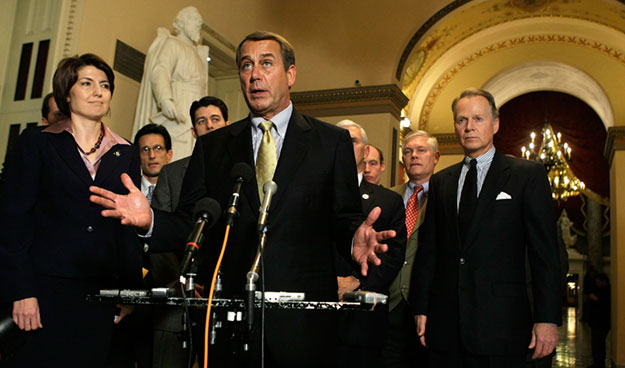As I’ve explained before, tying a budget bill or an increase in the debt ceiling to other policies was hardly something unprecedented. Heck, Democrats pretty much invented the practice. But because of the way congressional Republicans went about it this time — insisting on an unattainable goal, bickering among themselves about whether the goal was actually unattainable, failing to agree on more realistic fallback goals — it’s unlikely they’ll be any more successful using such bills as last-minute leverage anytime soon.
Videos by Rare
That doesn’t mean they aren’t right to continue making the case that: a) spending is too high; b) deficits remain too high and are spurring an unsustainable increase in the national debt; and c) Obamacare is exacerbating both a) and b).
So, how to proceed? Here are a few thoughts:
If you think our debt is driven by increasing the debt ceiling — rather than by appropriating more money than Washington receives in revenue — you’re wrong. If Republicans don’t want to increase the debt ceiling, they should pass a balanced budget.
That’s highly unlikely to happen in one fell swoop, so here’s an alternative: Pass a full-year budget, accompanied by just enough of a debt-ceiling increase to cover the borrowing needed to fund it. Send it to the Senate, where Democrats are almost certain to want more spending than the House GOP would approve — even if they appear to have completely forgotten how to pass any kind of appropriations bill other than a continuing resolution. Leave Senate Democrats to hold the bag as we approach the current debt ceiling, and to explain why getting their way on higher spending (or higher taxes) would be worth bumping up against the debt ceiling and wreaking the havoc they so solemnly warned about during the recent debate.
Better yet, pass a series of appropriations bills. Pass the first, most essential ones (e.g., Defense) without any increases in the debt ceiling, to illustrate a) how much spending can be done without borrowing more money, b) how much of our tax revenues are consumed by spending over which Congress tends to exercise no control (i.e., entitlements and debt payments), and c) the kinds of spending Washington does that requires us to borrow more money.
Playing off President Obama’s rhetoric about Congress “just doing its job” by passing a budget and “paying the bills,” refuse to take up any other non-emergency legislation until the budgetary matters are resolved. I mean: not so much as opening a new post office or naming a building after someone. Let Obama and Senate Democrats explain why they are prioritizing these lesser matters over Congress’ “job,” and make it plain that the Senate’s inaction on budget bills is one of the main reasons these things always come down to the last minute.
Finally, to each one of these budget bills congressonal Republicans should attach a budget-related policy: a revenue-neutral change to the tax code or spending, whether that means offsetting a closed loophole with a tax cut or offsetting a tax cut with lower spending. The prospects for any kind of “grand bargain” between House Republicans and the Democrats occupying the Senate and the White House may have been irreparably damaged: Relations between the two are simply too frayed. So, take a more incremental approach that might allow for a series of small victories that add up to more than we’re likely to get otherwise.
These kinds of actions would put House Republicans in a posture of governing while Democrats were left to explain why they were twiddling their thumbs. And that would go a long way toward convincing voters the GOP and conservative ideas can work.



